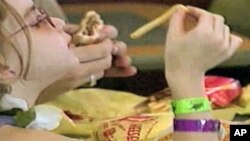Childhood obesity continues to spread in the U.S. and elsewhere. A new study finds excessive snacking is the main culprit.
One in three children in the United States is overweight or obese. A new study shows that some obese children as young as three have early warning signs for heart disease. Other studies show that obese children are more likely to stay obese as adults.
The study also says American children eat an average of three snacks a day on top of three regular meals, and the snacks account for almost one third of their daily calories.
Researchers at the University of North Carolina-Chapel Hill studied the eating habits of American children over a 30-year period. They looked at data on 31,000 children between the ages of two and 18. They found that desserts and sweetened drinks remain the major source of calories from snacks. Not far behind are salty snacks and candy.
In a recent hearing on childhood obesity, Surgeon General Regina Benjamin told lawmakers that the Obama administration is working on making healthy meals more accessible and affordable. "There is a growing consensus that we as a nation need to recreate our communities and environments where healthy choices are easy choices and affordable choices," she said.
Data shows the rate of childhood obesity has tripled over the last 30 years. To reverse the trend, experts agree that vending machines in schools should offer healthy alternatives.
"We need to do a much better job of making sure that what's in those vending machines is very consistent. We think that the time has come for standards," said US Agricuture Secretary Tom Vilsack.
The first lady has launched a program to motivate school children to eat healthy and to exercise.
The administration has also announced $400 million in federal assistance to help bring more grocery stores - with fresh produce - to underserved communities.
Many state education boards have cut recess and physical education. The federal government is encouraging schools to make more time so children can participate in physical activity.
"It's recommended that children get 150 minutes of exercise a week at elementary school and 225 minutes in secondary schools and yet they are not. For many schools PE (physical education) is an afterthought," Benjamin said.
The Centers for Disease Control is calling for taxes on sugary drinks and junk food, zoning restrictions on fast-food restaurants around schools and a ban on advertisements for junk food aimed at children.
The president's task force on childhood obesity plans to meet with Mr. Obama to deliver its recommendations on the issue.
















